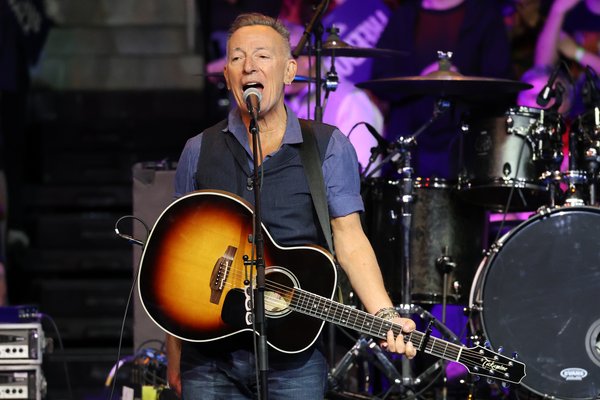When Bruce Springsteen unlocks his vault this summer with seven albums of unreleased material, the collection will include a project from his experimental turn for the recording of the Oscar-winning "Streets of Philadelphia" in the early-to-mid 1990s.
Demoed and recorded in Los Angeles in the summer and fall of 1993, Springsteen wrote the song for Jonathan Demme's acclaimed drama on the AIDS crisis "Philadelphia," which also earned Tom Hanks an Oscar for best actor. Its somber mood, heightened by the use of synth pads and drum loops, was a departure from Springsteen's heartland rock at a pivotal moment in his career after he had split with the E Street Band.
MORE: Author Kurt Vonnegut's rarely seen drawings are on display at Drexel
Guitarist Shane Fontayne, who was part of Springsteen's other band at the time, talked about the recording sessions that followed "Streets of Philadelphia" in a 2003 interview with the Springsteen fanzine Backstreets. The band recorded a collection of songs in 1994 for an unreleased album that was going to be called "Waiting On the End of the World."
"It had a hip-hop edge to it. And I thought the material was great," Fontayne told Backstreets, via the fan site SpringsteenLyrics.com. "Aside from the rush of recording with (Springsteen), it also was just a great-sounding record. When I've talked to him about it over the years, he always brings it up and says that he still thinks about releasing it."
Springsteen, in his 2016 autobiography "Born To Run," said the album's "dark" material is similar to "Streets of Philadelphia." It dealt with themes of troubled relationships, a topic Springsteen felt he had overdone.
"This would've been my fourth record in a row about relationships," Springsteen wrote. "If I could've felt its fullness, I wouldn't have hesitated to put it out. But a not-fully-realized record around the same topic felt like one too many."
The project may have been withheld partly because Springsteen's career was in a shaky place. Fans were disheartened by his break with the E Street Band, and Springsteen's two most recent releases, 1992's "Human Touch" and "Lucky Town," were met with mixed reviews. As Rolling Stone put it, Springsteen "seemed like yet another Eighties icon that would be unable to adjust to a post-Nirvana world," but the hit from the "Philadelphia" soundtrack reinvigorated interest in his next move.
Fontayne recalled that Jon Landau, Springsteen's manager and producer, felt the unreleased album "wasn't there" lyrically. It was shelved so that Springsteen could rejoin the E Street Band to record tracks for the "Greatest Hits" compilation released in 1995. Later that year, Springsteen put out "The Ghost of Tom Joad," an acoustic album that was praised mainly for Springsteen's social commentary.
The only known song written during the 1994 sessions that has ever been heard is the title track "Waiting On the End of the World," which was re-recorded with the E Street Band during the "Greatest Hits" sessions the following year. That version leaked and was later bootlegged, but the original remains in Springsteen's archives.
While it would be a stretch to say the 1995 version of "Waiting On the End of the World" sounds much like hip-hop, which went mainstream in the early 1990s, the instrumentation on "Streets of Philadelphia" shows a degree of experimentation that could be a unique patch of Springsteen's career — an attempt to adapt with newer sounds shaping the music industry.
Springsteen, 75, announced Thursday that "Tracks II: The Lost Albums" will give fans 83 songs that span more than three decades of recording sessions from 1983 to 2018. The project, which Springsteen had teased last year, is due out June 27 via Sony Music. Springsteen last put out a collection of B-sides, outtakes and unreleased recordings in 1998's "Tracks" box set.
In a trailer for the new collection, Springsteen said he prepared the material during the COVID-19 pandemic. Some of the projects had reached advanced stages of production when they were first made, including the country-inspired "Somewhere North of Nashville" and Mexican-influenced "Inyo."
"'The Lost Albums’ were full records, some of them even to the point of being mixed and not released," Springsteen said. "I’ve played this music to myself and often close friends for years now. I’m glad you’ll get a chance to finally hear them."



